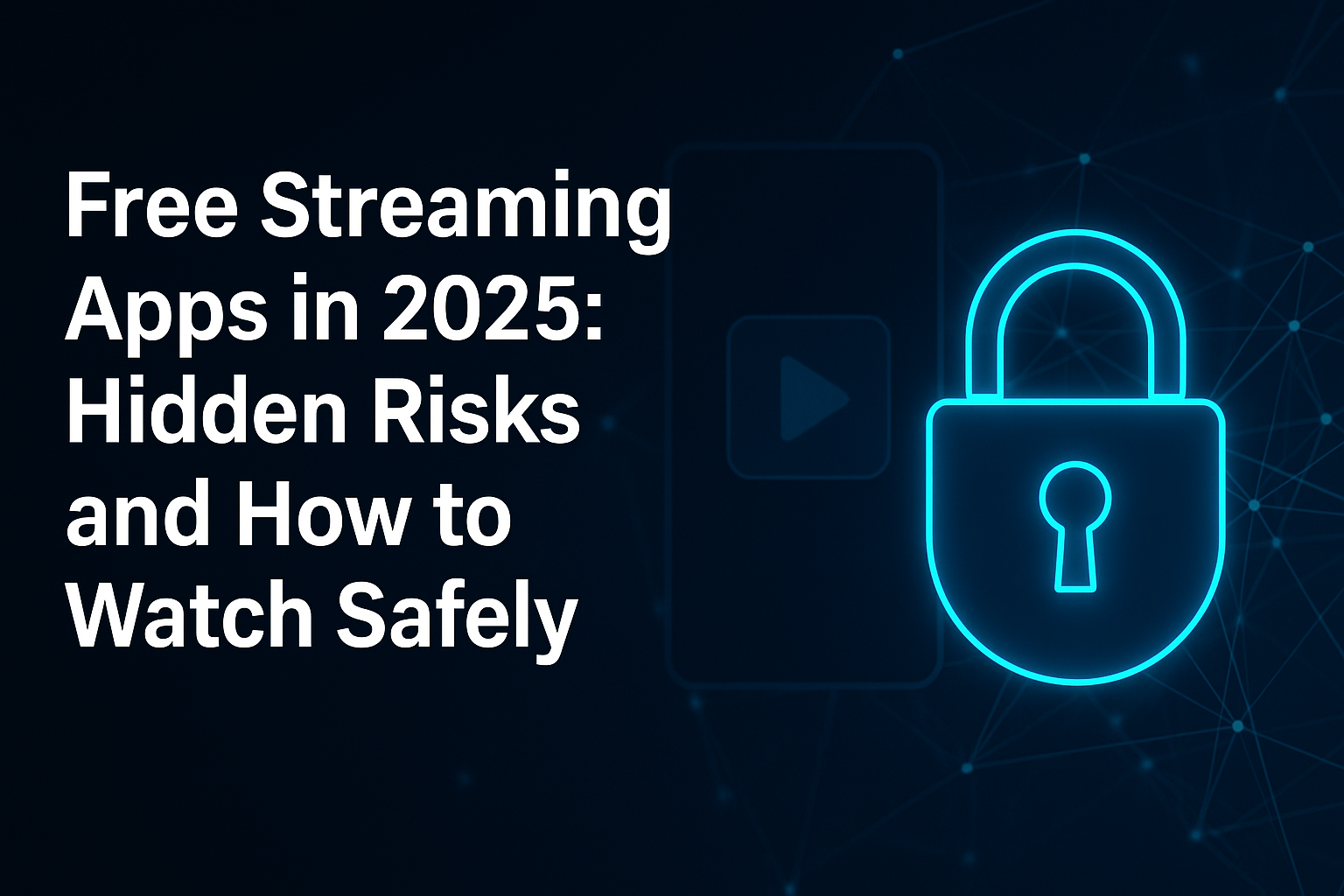Are Free Streaming Apps Safe? Hidden Risks and How to Watch Safely in 2025

Strong 8k brings an ultra-HD IPTV experience to your living room and your pocket.
Ever thought about how easy it is these days to watch almost anything for free? One tap on your phone and you’ve got endless movies, trending shows, or niche anime episodes ready to watch. Free streaming and aggregator apps have completely changed how millions of us watch and share entertainment.
But for all that convenience, there’s a side we often ignore. Hidden behind the “free” label are privacy risks, sneaky trackers, and security gaps that don’t get enough attention. In this guide, I’ll break down how these apps really work in 2025, the new threats making news lately, and smart ways to stream safely without paying with your personal data.
And at the end, I will also share my personal recommendation for a trusted app that keeps offline streaming simple and secure.
The Rise of Free & AVOD Streaming Apps
Free streaming apps aren’t new, but they’ve exploded in popularity over the past few years. The technical term for this model is AVOD — Ad-Supported Video on Demand. Basically, instead of paying with cash, you’re paying with your attention (and often your data) by watching ads.
Big players like Tubi, Pluto TV, and Kucing App have become household names in the US and many parts of Europe. They offer thousands of movies and shows completely free — you just watch a few ads along the way.
Then there are regional aggregators gaining popularity, too. Just a few weeks ago, I came across news about Bioscope+, a new platform in Bangladesh that combines multiple streaming services under one app. This kind of all-in-one aggregator works well because people love the idea of switching between channels, movies, and even live TV without juggling ten different logins.
What makes these apps so appealing is clear:
- No subscription fees.
- Easy to install on any phone or tablet.
- Many offer offline downloads, so you can save content and watch later.
For many people, especially students or families on tight budgets, these apps feel like the perfect fix. But there’s a hidden cost that often doesn’t get enough attention — the price you pay with your personal data.
How Free Streaming Apps Make Money
If you’ve ever wondered how these apps stay in business while offering free access to big-name movies and shows, the answer is simple: Advertising and Data.
The ads you watch keep the lights on, but it’s the data that really fuels this business model. Below, I will explain how they really make money so that you can see why your data is so valuable to them.
Your Data is Part of the Deal
Here’s where things get more hidden. Many of these apps collect information about what you watch, when you watch it, and even where you are. Some apps track the device you’re using and how you interact with ads. According to a recent OTT security report I read, a big chunk of their income can come from sharing this data with advertisers or marketing partners.
This news was all over my LinkedIn feed recently because so many folks don’t realize how much of their personal information is floating around when they hit “Play.” While most big-name services are upfront about their data collection (if you dig through the privacy policy), lesser-known apps might collect even more than you think.
They Rely on Ads
Most free streaming apps run on ads. Every time you watch a movie or show for free, you’re likely watching a few ads in between. This is how apps like Tubi and Pluto TV cover the cost of streaming rights and make a profit.
The truth is, ads alone rarely cover all the costs for these platforms. Selling or sharing user data for targeted ads or marketing partnerships makes up the shortfall. It’s worth remembering: if you’re not paying with money, you’re often paying with your personal details.
Common Security Risks in Free Streaming Apps
While free streaming apps make life easy for movie lovers, they can also open the door to real problems if you’re not careful. In 2025, security experts kept finding the same types of weaknesses in streaming apps, which include, but are not limited to, weak password rules and poor updates.
Weak Protection for Logins
Some free streaming apps don’t do enough to protect your login details. If they don’t use strong locks (encryption) or force you to use a strong password, hackers can break in and steal your account or personal info.
Risky Ads and Fake Apps
Another issue is fake apps that look just like the real thing. Hackers use these clones to trick people into downloading malware or adware.
Even legit apps sometimes show risky ads that open sketchy sites or pop-ups that can trick you into giving away your data. I saw a security expert share a case study about this on LinkedIn just a few weeks ago, where he pointed out how many free movie and TV apps fail basic safety checks.
Slow to Fix Problems
Free streaming apps often don’t fix security bugs as quickly as they should. If they don’t update regularly, old flaws stick around, and hackers love old flaws because they’re easy to exploit. This is why downloading apps only from trusted sources and keeping them updated matters so much.
UK’s New Age Checks and VPN Boom
Something else that caught my eye this year was the big change in the UK’s online safety rules. Under the new law, people have to show photo ID or even do a face scan to access certain kinds of content online, including mature or “harmful” shows and apps. This news was all over my social feed because a lot of people are worried about handing over even more personal data just to watch something that’s technically for adults.
Naturally, more people are turning to VPNs to get around these new blocks and checks. A VPN (Virtual Private Network) hides your real location and makes it harder for anyone, even your internet provider, to track what you’re doing. It can also help you watch shows from other countries that might be blocked where you live.
But there’s a catch. Free VPNs often promise a lot, but can be risky too. They can log your activity and sell it to advertisers, which defeats the whole point of staying private. Picking the wrong VPN could put you right back where you started: trading your data for access.
Should You Trust Offline Features of Streaming Apps?
A lot of free streaming apps now offer an offline option where you can download the movie or show, and watch it later without needing the internet. This sounds safer because it cuts out pop-ups and risky ads that usually appear when you’re streaming live.
And it does help. When you’re watching downloaded content, the app isn’t constantly sending info about your viewing back to its servers in real time. That’s good. But the moment you reconnect, some apps still ping their servers about what you watched, when you watched it, and sometimes where you were when you opened the file.
So yes, offline is smart, but it’s not a magic shield. It works best when you pair it with a good and trusted app.
How to Protect Yourself When Using Free Streaming Apps
At the end of the day, free streaming apps aren’t going anywhere, and neither are the risks. But that doesn’t mean you can’t enjoy them safely. Over the years, I’ve picked up a few simple habits that help keep my devices clean and my data private.
Pick trusted apps only
Always download from official app stores and check reviews. Look for apps with clear privacy policies and regular updates. For example, the APK Kucing, which I personally recommend, lets you download movies for offline watching without spamming you with risky ads or collecting more data than needed.
Limit app permissions
If an app wants access to your contacts or messages just to stream a movie, that’s a red flag. Give it only what it really needs.
Use a reputable VPN
If you want to keep your location private or unlock geo-blocked content, go for a good paid VPN service. Free VPNs are tempting, but they often do the same shady tracking as the apps you’re trying to avoid.
Keep apps updated
Updates fix bugs and patch security holes. Don’t skip them.
Read privacy policies
Not the most exciting read, I know, but a quick scan tells you what data an app collects and who it’s sharing it with.
Be cautious with new aggregator apps
Aggregators like Bioscope+ are convenient but bring extra layers of tracking.
FAQs
Are all free streaming apps legal?
Not always. Many AVOD apps like Tubi and Pluto TV have legal deals, but some free apps stream pirated content.
What’s the difference between AVOD and aggregator apps?
AVOD means the app shows ads to cover costs. An aggregator combines content from several services or channels in one place.
Can I watch safely offline?
Mostly, yes. Offline viewing reduces pop-ups and risky ads. Just stick to trusted apps.
Conclusion
Streaming movies and shows for free is something millions of us love — and it’s not going away anytime soon. But like anything free online, it pays to know what you’re giving up in return. With ads, trackers, and sometimes sloppy security, these apps can quietly take more from you than you expect.
By sticking with trusted apps like Kucing apk, managing what you share, using tools like VPNs wisely, and choosing offline features when possible, you can enjoy the bst of free streaming without putting your privacy at risk.
I hope these tips help you watch smarter in 2025 and beyond. Stay safe and stay entertained.
Note: Images are AI-generated.
Note: IndiBlogHub features both user-submitted and editorial content. We do not verify third-party contributions. Read our Disclaimer and Privacy Policyfor details.


